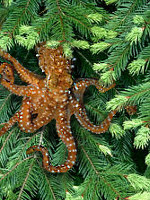The site that started it all is:
http://zapatopi.net/treeoctopus/
and includes these “photos.”


The Wikipedia entry for Pacific Northwest tree octopus,
http://en.wikipedia.org/wiki/Pacific_Northwest_tree_octopus, adds that the site was set up in 1998 by Lyle Zapato. Even though he included a number of falsehoods on the site, such as “its affiliation with People for the Ethical Treatment of Pumpkins (P.E.T.PU.)” most students who read the site believed it.
Two sources were listed at the Wikipedia entry that give the actual research study information should you want to read those studies:
- ^ Beth Krane (November 13, 2006). “Researchers find kids need better online academic skills”. UComm Advance (University of Connecticut) 25 (12). http://advance.uconn.edu/2006/061113/06111308.htm. Retrieved 2008-01-11. “Don Leu, Chair in Literacy and Technology at UConn, “… anyone can publish anything on the Internet, and today’s students are not prepared to critically evaluate the information they find there.””.
- ^ Matthew Bettelheim (March 14, 2007). “Tentacled Tree Hugger Disarms Seventh Graders”. Inkling. http://www.inklingmagazine.com/articles/tentacled-tree-hugger-gets-legs-up-on-twelve-year-olds/. “Of the 25 seventh-graders identified as their schools’ best online readers, 24 recommended this bogus website to another class that Leu had told them was also researching endangered species.”.
Given this, even though the site was not intended for use as such, it is often used in Internet Literacy classes. Internet Literacy, as defined by the American Library Association and quoted on on Wikipedia’s entry for this, is: “To be information literate, a person must be able to recognize when information is needed and have the ability to locate, evaluate, and use effectively the needed information.”
The article at Wikipedia goes to note that Terry Pratchett even referred to the tree octopus in his novel, Nation:
“The concept of “nation” can be extended to embrace all of humanity, anchoring Nation in the philosophy of humanism as an answer to the question of “what is the role of the individual in society?” As with the Tiffany Aching series, Nation contains an undercurrent of passive faith transforming into active scientific enquiry, without losing moral dimensions in the process. Pratchett reinforces this theme with an offhand reference to outspoken atheist and humanist Richard Dawkins as “that nice Professor Dawkins” who was bitten by a tree-climbing octopus).”
Anyways, just a really entertaining and interesting example……

